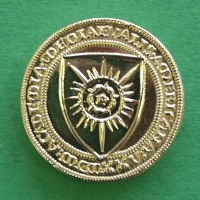| Haskins Medal | |
|---|---|
 | |
| Awarded for | Production of a distinguished book in medieval studies |
| Country | United States |
| Presented by | Medieval Academy of America |
| First award | 1940 |
| Currently held by | Lea DeVun |
The Haskins Medal is an annual medal awarded by the Medieval Academy of America. It is awarded for the production of a distinguished book in the field of medieval studies. [1]